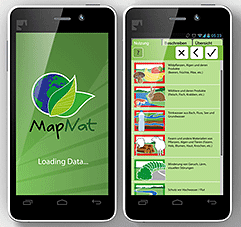News
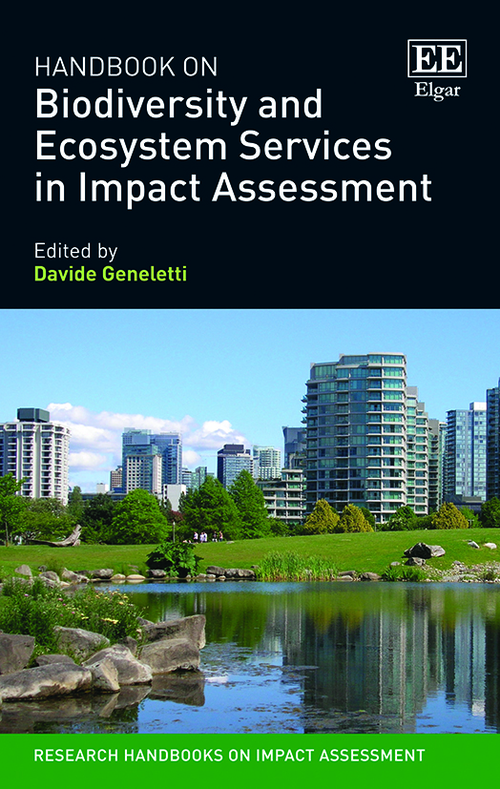 The new new Handbook on "Biodiversity and Ecosystem Services in Impact Assessment", presents methodological guidance and discussion of international practice related to the integration of biodiversity and ecosystem services in impact assessment. The volume edited by ESMERALDA researcher Davide Geneletti, features variety of case studies to provide examples of the use of information on biodiversity and ecosystem services in different types of impact assessment to improve decisions at all levels, from strategic choices to individual projects. The Handbook presents a range of applications and possible solutions to challenges in key policy and planning sectors, including urban development, land use, energy, marine areas, infrastructure, agriculture, forestry, health and tourism.
The new new Handbook on "Biodiversity and Ecosystem Services in Impact Assessment", presents methodological guidance and discussion of international practice related to the integration of biodiversity and ecosystem services in impact assessment. The volume edited by ESMERALDA researcher Davide Geneletti, features variety of case studies to provide examples of the use of information on biodiversity and ecosystem services in different types of impact assessment to improve decisions at all levels, from strategic choices to individual projects. The Handbook presents a range of applications and possible solutions to challenges in key policy and planning sectors, including urban development, land use, energy, marine areas, infrastructure, agriculture, forestry, health and tourism.
Find the handbook on the following links:
http://www.e-elgar.com/shop/handbook-on-biodiversity-and-ecosystem-services-in-impact-assessment
http://www.elgaronline.com/abstract/9781783478989.xml?rskey=Mo1hbU&result=1
The workshop Assessment and Economic Valuation of Recreational Ecosystem Services (RES) of Landscapes in EU Member States will take place at Leibniz Universität Hannover, Germany, on September 12-13, 2016. The workshop picks up the challenge of assessing and valuing ecosystem services as stipulated by target 2, action 5 of the EU Biodiversity strategy (i.e. Mapping and Assessment of Ecosystems and their Services – a process commonly abbreviated as MAES, http://biodiversity.europa.eu/maes).
The objectives of the workshop are:
1. To bring together and discuss the best available knowledge concerning RES of landscapes in EU member states, that is spatial analysis and quantification of potentials, estimation of demand as well as actual use, and economic valuation,
2. To synthesize commonalities and differences, current bottlenecks and new ideas for further research to advance the theory and practice of RES mapping, assessment and economic valuation in the context of MAES, including suggestions for harmonizing the diversity of approaches,
3. To develop material and insights for a joint publication effort on the topic such as a special issue or joint paper, depending upon the interest of participants,
4. To initiate and enhance across EU member states’ knowledge exchange and cooperation around RES assessment and valuation approaches.
The workshop is planned as a 1,5 day meeting addressing (i) approaches and methods for assessing and mapping potentials of RES of landscapes, (ii) approaches and methods for modelling the demand as well asactual use of RES, and (iii) approaches and methods for the economic valuation of RES. A final session (iv) will integrate the results and discuss future steps of cooperation.
To join the workshop, fill in the registration form available in the conference flyer and send it to hermes@umwelt.uni-hannover.de until July 31, 2016. If you wish to present a paper or a poster, please add a short abstract (max. 300 words). The number of participants will be restricted to ensure a reasonably size for collaboration. Therefore, only an early registration will assure your place.
Our latest workshop, which took place from 14 to 16 April 2016 in Nottingham, UK, brought together 51 representatives from countries across Europe, including all ESMERALDA partners, together with potential new consortium members. During the event participants looked at developing a common understanding within ESMERALDA of methods for mapping and assessing ecosystems and their services, and how they could be used in the context of different ecosystem types, services, "tiers" and spatial scales, cross-referenced to the CICES framework.
Learn more about the workshop and its outcomes from the video:
Today, ESMERALDA is launching its brand new Insider rubric! Every few weeks we will post profiles of our consrtium members to give you insights on their research interests and role in the project. Tune in to learn about what motivates scientists in their work, and how are they hoping to contribute to society with their research.
To kick start the rubric, we feature two profiles - our project coordinator Dr Benjamin Burkhard pioneers the initiative, alongside SYKE Senior researcher Dr Petteri Vihervaara.
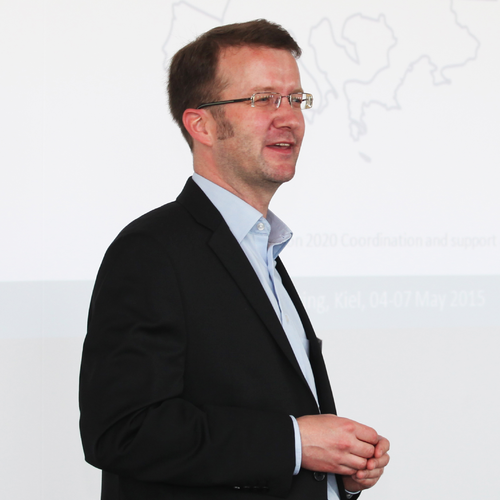
Dr Burkhard is a geographer working as a senior researcher at Kiel University in Germany. Since 2001 he has worked on various ecosystem services projects, involved in research areas ranging across irrigated rice agriculture in Southeast Asia, landscape management in Finland, Bulgaria and integrative coastal zone management in the North Sea.
Being the first project where Dr Burkhard takes the coordinating role, here is what he shared with us on his experience and coming up with the idea behind ESMERALDA.
 Dr Petteri Vihervaara is a senior research scientist at SYKE, currently also working as a research programme manager and coordinating SYKE’s Ecosystem Services research programme.
Dr Petteri Vihervaara is a senior research scientist at SYKE, currently also working as a research programme manager and coordinating SYKE’s Ecosystem Services research programme.
Lately, his work has been deeply linked with the implementation of the Mapping and Assessment of Ecosystem Services (MAES) work in Finland, as well as coordination of new research opportunities on the whole field of ecosystem services and biodiversity. Read more.
Follow the Insider rubric for more updates on the work of our researchers.
The first phase of ESMERALDA was dedicated to the identification of relevant stakeholders and stocktaking of the implementation of MAES (Mapping and Assessment of Ecosystems and their Services) in all EU member states.
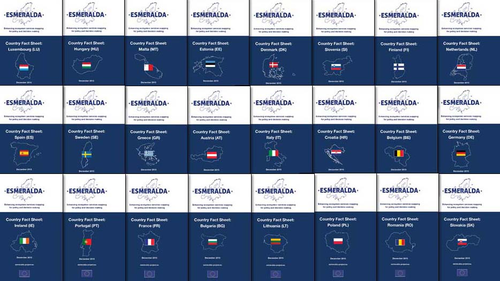
One key outcome of this phase are the EU Country Fact sheets (project Milestone 09) containing information about each country’s MAES-related activities, implementation prerequisites and needs as well as relevant policy and research activities. The fact sheets were produced based on information collected by the ESMERALDA project partners as well as related policy and research activities such as the MAES Working Group and the MESEU project.
All fact sheets are now available on BISE, the Biodiversity Information System for Europe, for the different countries within the platform’s MAES-related developments in the European Union section.
 The sharing of information between ESMERALDA and BISE is based on ESMERALDA Milestone 31, under which stakeholders from the European Commission, different institutions and projects meet regularly to discuss inter-operability of ESMERALDA outputs into common platforms.
The sharing of information between ESMERALDA and BISE is based on ESMERALDA Milestone 31, under which stakeholders from the European Commission, different institutions and projects meet regularly to discuss inter-operability of ESMERALDA outputs into common platforms.
Two other highly relevant outcomes from the first project phase are Deliverables 2.1 "Clustering of EU Member States according to their prerequisites and needs to perform ES mapping and assessment" and 2.2 "Ecosystem service mapping and assessment gaps in EU member states and recommendations to overcome them", giving an overview of the stocktaking of MAES implementation in EU member states. All publicly available reports can be downloaded here.
With the aim of supporting EU countries in the Mapping and Assessment of Ecosystems and their Services (MAES) process, ESMERALDA held a dedicated workshop to look at and discuss existing methods and how they could be used as part of an integrated assessment.
The workshop, which took place from 14 to 16 April 2016 in Nottingham, UK, brought together 51 representatives from countries across Europe, including all ESMERALDA partners, together with potential new consortium members.
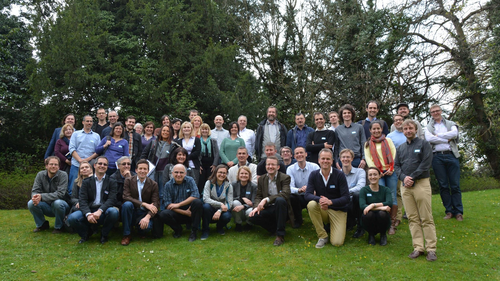
Participants at the ESMERALDA Workshop in Nottingham, UK, 14-16 April 2016; Photo Credit: Pensoft
Using results from existing and ongoing ESMERALDA reports, participants looked at developing a common understanding within ESMERALDA of methods for mapping and assessing ecosystems and their services, and how they could be used in the context of different ecosystem types, services, "tiers" and spatial scales, cross-referenced to the CICES framework.
ESMERALDA aims at supporting European countries in fulfilling their duties in relation to the EU Biodiversity Strategy’s Target 2 Action 5 "Mapping and Assessment of Ecosystems and their Services" (MAES). In the second project phase that has just been started, ESMERALDA will develop a first version of a report on flexible methods for mapping and assessing ecosystem services.
In the discussion sessions the experts looked at biophysical, socio-cultural and economic methods in order to identify the potential relationships between ecosystem services and specific methods, as well as the potential linkages between the methods themselves.
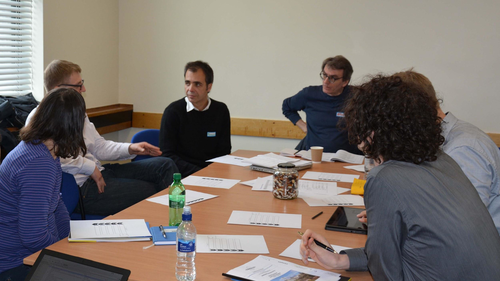
Discussing biophysical methods for MAES in one of five dedicated breakout groups during the workshop; Photo Credit: Pensoft
Results and feedback from the workshop will serve as a basis for the selection of methods to be used and tested within the project’s selected case studies. The final aim is to get an overview of available methods, their strengths and weaknesses and potential application for ES mapping and assessment to serve for building a holistic flexible methodology in the next phase of ESMERALDA.
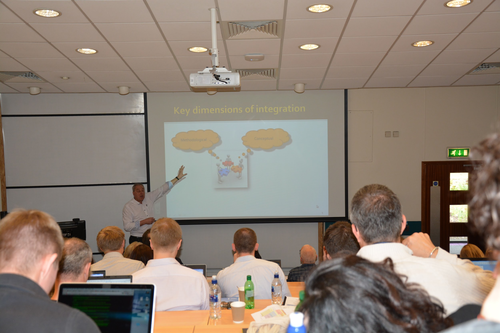
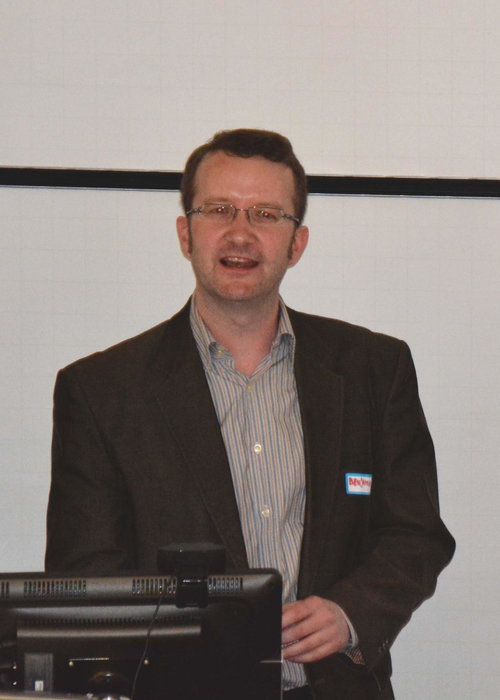

Clockwise from top: Local host from Nottingham Roy Haines-Young on quantification of ecosystem services; ESMERALDA Coordinator Benjamin Burkhard opening the workshop; Field trip at the Melbourne Parklands; Photo Credits: Pensoft
A recent publication in Trends in Ecology & Evolution has posed some criticism on the concept of Ecosystem Services. The article authored by Jonathan Silvertown, University of Edinburgh, draws attention to the argument that this concept, encapsulating the ways in which human society depends upon the existence and functioning of nature, also draws power by chiming with dominant neoliberal ideology.
Since its publication, the article has received some attention from scientists that work within this sphere, resulting into several replies - some of which have been officially published alongside the original piece in the journal. The responses bring more points for consideration and invites for further more holistic and balanced debate within the discipline. ESMERALDA partner Marion Potschin and her colleagues are among the critical reviewers of the original paper.
Learn more and read the article, followed by all published responses here.
The Climate Action and Resource Efficiency Directorate of DG Research and Innovation organised on 29 February 2016 in Brussels a science – science interface workshop with an emphasis on biodiversity and ecosystem services related themes. The objective of the meeting was to identify synergies between EU funded research and networking projects and actions; foster collaboration on scientific and technical issues, as well as communication and science-policy strategies.
Projects funded under various funding schemes such as FP7, Horizon 2020, Biodiversa, LIFE+, and COST were invited to the meeting. Joachim Maes represented ESMERALDA at the meeting.
The discussions were organised in working groups along five themes: • basic research • applied research • technological developments • prototypes • demonstration projects.
The working groups identified needs and areas for collaboration within and between these themes, discussed bottlenecks and barriers, and proposed possible solutions.Solutions to enhance collaboration between all the different projects include: • More flexibility in the funding schemes to respond better to emerging calls, • Separate funding mechanisms for post project meetings and for workshops and • Open data and publishing.
The European Commission will make a report of the meeting available.
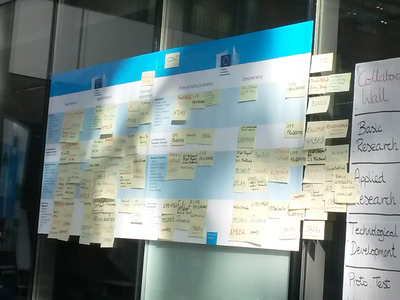
From 25 to 26 February 2016, around 20 experts from 10 different European countries met at the European Environment Agency (EEA) in Copenhagen, Denmark. The workshop is part of ESMERALDA (Milestone 19) and was organised by Marion Potschin and Roy Haines-Young from the ESMERALDA partner University of Nottingham (UNOTT, leader of Work Package 4 on Ecosystems Service Assessment Methods) and hosted by the European Environment Agency.
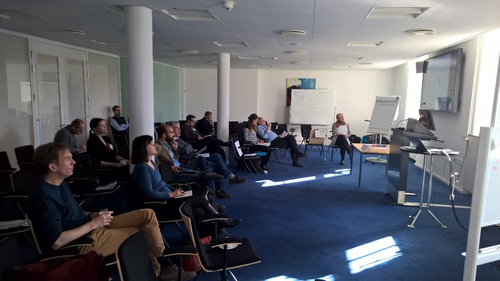
Picture: Workshop participants following a video presentation; Credit: B. Burkhard
The aim of the workshop was to take stock of the experience gained in using the Common International Classification of Ecosystem Services (CICES) Version 4.3 for mapping and assessment, and to advise on the objectives for any future revision and the development of guidelines to help people apply it effectively. The workshop has drawn on interim results from the current consultation on CICES that will be completed in April 2016 (see www.cices.eu).
The outcomes of the meeting will be published as a project Milestone report, helping to define options that can be developed in the CICES revision process and how changes can help meet current user needs. The results will support the development of the ESMERADLA guidelines for a flexible, integrated ecosystem service assessment methodology. Outcomes from the workshop and further insights from the consultation will also be presented during the ESMERALDA workshop II in Nottingham in late April and will form the basis for M20 "CICES-consistent library of indicators for biophysical, social and economic ES dimensions".

From January 26-28, 2016, around 20 experts from EU enlargement countries and EU member states met at the European Commission’s Joint Research Centre (JRC) in Ispra, Italy. The enlargement countries were represented by participants from Bosnia and Herzegovina, Iceland, Israel, Montenegro, Serbia and Turkey.
ESMERALDA was represented by Joachim Maes (Workshop chair), Grazia Zulian, Benjamin Burkhard, Fernando Santos, Davide Geneletti and Markus Erhard. The aim of this workshop was to take stock of the progress made in EU enlargement countries on mapping and assessment of ecosystems and their services, to analyse gaps in knowledge and to initiate training activities on mapping and modelling ecosystem services using a tiered mapping approach.
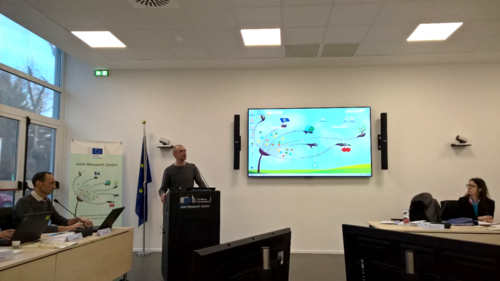
Picture: Joachim Maes is opening the Workshop.
The Workshop aimed at increasing the capacity of enlargement countries to meet their international obligations under the Convention of Biological Diversity and increase the role of the MAES activities as crucial input to the IPBES regional assessments.
More information can be found at the JRC’s website:
https://ec.europa.eu/jrc/en/event/workshop/mapping-and-assessment-ecosystem-services-enlargement-contries
The Routledge Handbook of Ecosystem Services, edited by Marion Potschin, Roy Haines-Young, Rob Fish and Kerry Turner is now published. The volume includes input from people in ESMERALDA who contributed chapters on Indicators for Ecosystem Services, Mapping Ecosystem Services, and Ecosystem Services in the Mediterranean Basin and several other topics.
This handbook provides a comprehensive reference text on ecosystem services, integrating natural and social science (including economics). The volume aims to demonstrate the importance of biodiversity for people, policy and practice. The handbook also shows how the value of ecosystems to society can be expressed in monetary and non-monetary terms, so that the environment can be better taken into account in decision making.
The book contains over 50 chapters and seven briefing notes, and spans the spectrum of ecosystem issues from concepts, methods through to applications. In his forward Sir Robert Watson, Professor of Environmental Sciences, at the University of East Anglia in the UK wrote:
"This handbook, written by world-class academic and policy experts, is long overdue, and provides a much-needed guide to address this challenge. It is an authoritative reference text written in easy to read sections that is essential reading for academics, decision-makers and civil society."
A discount is available by using the code in the flyer attached, for those who are interested to buy a copy or encourage their library to obtain one.
For more information see: https://www.routledge.com/products/9781138025080
The Belgium Ecosystem Services (BEES) network is a community of practice aiming to connect different societal actors involved in ecosystem services research, practice and policy-making. In December 2015, for a second year BEES had organized a X-mas market with the aim to bring together scientists, practitioners and policy makers in an informal setting to stimulate interaction and exchange of ideas.
ESMERALA was also present at the market with a separate stand where the project was showcased, the project was also included in the reporting video. Learn more about the participants and outcomes of the market in the video below:
BEES Christmas Market 2015 from Belgian Biodiversity Platform on Vimeo.
ESMERALDA is featured in the Research & Innovation news to expose the project to a great audience across Europe and the World.
"EU-funded project ESMERALDA is developing ways to assess Europe's biodiverse ecosystems and their many contributions to society and the economy." states the story going in deph through the ways in which the project aims to provide methods to asses the state of ecosystems across Europe towards supporting Action 5 of the EC Biodiversity Strategy 2020.
Read more in the original news story.
Just 10 days before Christmas EMSERALDA participated at the BEES Christmas Market, which took place on 15 Dec 2015 in Brussels, Belgium. The event brought together experts, NGOs and organizations working in the sphere of ecosystem services to discuss and present their work.
ESMERALDA had its own stand where we had the opportunity to showcase our aims and objectives and discuss future work.
We want to wish you a Merry Christmas and a Happy New Year with this picture from the event and wish the project another year of fruitful work!
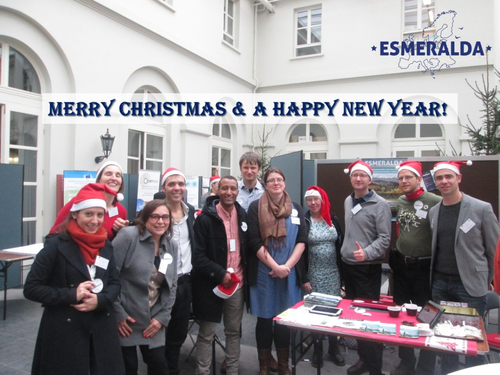
The first ESMERALDA Stakeholder Workshop took place from 13 to 16 October 2015 in Riga, Latvia, as the first of a series of events planned to enhance the project collaboration with stakeholders. The event brought together project partners and stakeholders to discuss the state and gaps of ecosystem service mapping and assessment activities in their countries, and the ways ESMERALDA outputs can feed into their work to achieve Action 5 of the EU Biodiversity Strategy.
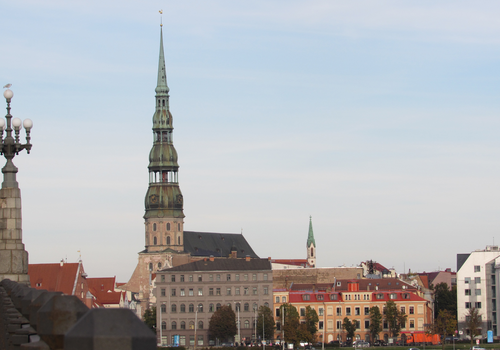
View from Riga, Latvia where the workshop tool place. Credit: I. Kuzmova
The event, organised by the ESMERALDA partners Finnish Environment Institute (SYKE) and the Baltic Environmental Forum (BEF), was attended by over 70 participants - policy and decision makers, as well as other professionals working in the field of ecosystem services, from across EU member states.
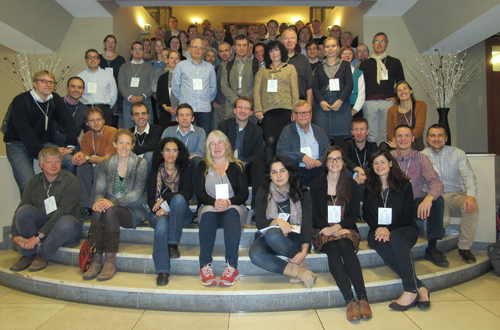
Group photo, more that 70 participants from across EU Member states. Credit: I. Kuzmova
ESMERALDA aims at supporting national stakeholders in order to fulfil their tasks within the EU Biodiversity Strategy 2020. Target 2 Action 5 of the strategy asks all EU member states to map and assess ecosystems and the services they provide within their national territories. ESMERALDA further aims to develop a flexible methodology for mapping of ecosystems and ecosystem services to provide building blocks for pan-European, regional and local assessments as contributions to the EU Biodiversity Strategy.
ESMERALDA will provide:
-
a set of practical policy recommendations, among others based on thematic case studies carried out in the project;
-
a set of recommendations for the future development and implementation of related policies;
-
practical guidance, data and tools for using biodiversity and ecosystem-related data in other policies.
Stakeholder engagement is therefore key for ESMERALDA in order to identify needs within the individual member states and to provide the right support and coordination for related activities, to fulfil requirements of policy making and to integrate them into the project research.
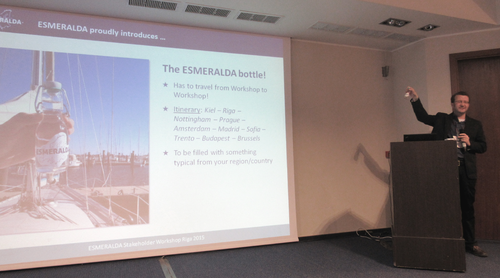
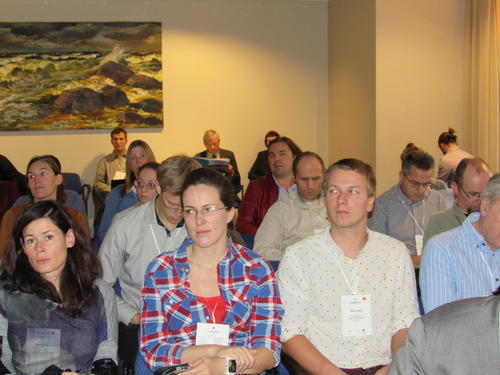
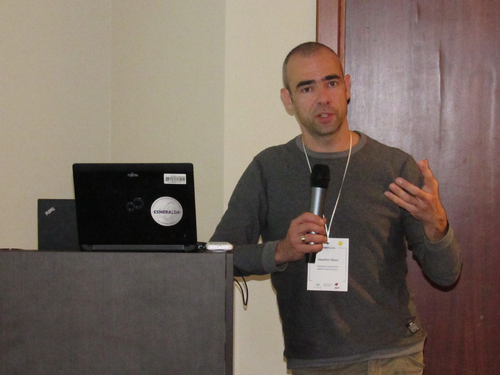
Top: Project coordinator B. Burkhard passes the ESMERALDA Workshop symbol 'the ESMERALDA Bottle' to the local organizers; Left: Participants at the meeting; Right: Joachim Maes presenting during the workshop. Credit: I. Kuzmova
Presentations form the meeting:
General overview of ESMERALDA activities_B.Burkhard
Welcome words by the host Baltic Environmental Forum Latvia_K.Veidemane
Stakeholder network and mapping and assessment activities _L.Kopperoinen
Update biodiversity strategy and MAES_J.Maes
Final discussion on recommendations for how to get forward_B.Burkhard
September was an eventful month for ESMERALDA. In the middle of the month, the project held a series of key meetings to set the foundation for future collaboration not only within the project itself, but also with key stakeholders and related projects.
On 15 Sep, in Brussels, ESMERALDA had the fifth of its regular Executive Board meetings, designed to bring together project partners and set objectives for the next period. On the next day, 16 Sep, followed the first Science-Policy-Society Advisory Board (SPSAB) meeting, as well as the first of a series of meetings designed to bring ESMERALDA in the same room with related projects, representatives from the European Commission and relevant initiatives to discuss future axes of collaboration.
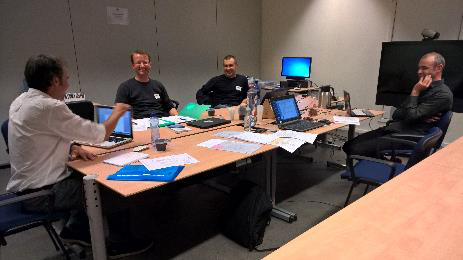
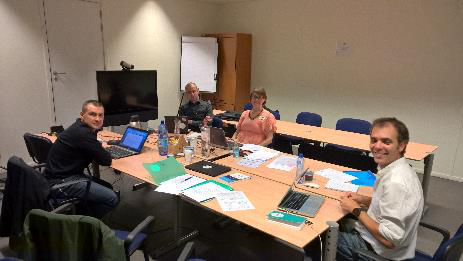
Images from the 5th Executive Board meeting in Brussels. Credit: B. Burkhard
While the routine Executive Board meeting was targeted at keeping in check past tasks and set a working plan for the next couple of months, the SPSAB meeting on the next day was a first of its kind for the project. The role of the multidisciplinary SPSAB is to advise the ESMERALDA Executive Board on the project performance, progress and on international developments in the scientific field. The Board consists of international key science and policy professionals working in relevant fields, and acts as a peer-review panel with respect to new project proposals, the research results as a whole and the training and communication activities.
The 16 Sep was a date marked by another important project workshop where ESMERALDA met key European projects and initiatives. This was a first of a series of workshops aimed to develop ESMERALDA communication with relevant initiatives to foster future collaboration and visibility of results.
<blockquote class="twitter-tweet" lang="en" align="center>
@ESMERALDA_H2020 meets with http://t.co/ZDP9A9BLpq and http://t.co/gl6oZtBM3y to see how #MAES results can feed these information systems
— Joachim Maes (@MaesJoachim) September 16, 2015
During this first workshop ESMERALDA met with representatives from the OPPLA and BISE online platforms, designed to collect information and foster collaboration between EU projects in the spheres of Biodiversity, Ecosystem services, and Ecology. More information about the two platforms and other relevant projects and initiatives is available here.
On 17 Sep, several project partners participated in the 10th Meeting of the EU Working Group on Mapping and Assessment of Ecosystems and their Services (MAES). MAES is highly relevant and ESMERALDA has been designed to significantly support the Working Group’s activities. The MAES meeting was followed by a meeting on how MAES can support the deployment of Green Infrastructure in Europe on 18 Sep in Brussels.
Humankind benefits in multitude ways from biodiversity, ecosystems and the services they provide. Such services include for example the provisioning of drinking water, food security, air quality regulation or recreation.
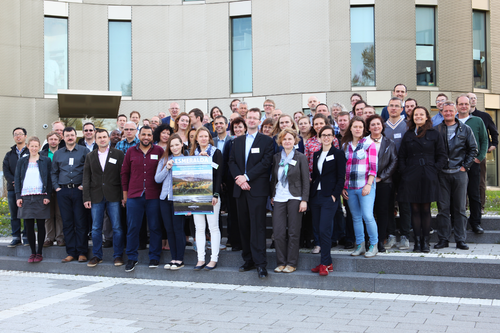
Esmeralda group photo; Credit: Christian Urban, Uni Kiel
The new collaborative EU Horizon 2020 funded project "ESMERALDA - Enhancing ecosystem services mapping for policy and decision making" looks into the needs of policy and decision-makers in EU member states for flexible methodologies, tools and data for sustainable management of ecosystems and their services.
The project held its official kick-off meeting from 5 to 7 May 2015 at Kiel University (CAU), Germany. Around 70 representatives, including scientists, experts and stakeholders of 25 partner organisations from 20 European countries met for the start of the three and a half year coordination and support action.
The ESMERALDA project is planned to serve as an important basis for implementing the European Commission's Biodiversity Strategy 2020, adopted in 2011, which aims to prevent the loss of biological diversity, and to improve the state of European species, living areas, ecosystems and ecosystem services.
The project will create flexible methodologies to provide the building blocks for pan-European and regional assessments of ecosystems and their services as an essential part for informed decision making and a core of the EU Biodiversity Strategy.
"The data collected during ESMERALDA will assist the European states involved towards reaching the goals of the EU Biodiversity Strategy, step by step," said the project coordinator, Dr Benjamin Burkhard, of the Institute for Natural Resource Conservation at Kiel University.
"This first meeting puts the initial building blocks into a three-and-a-half-year joint research initiative that will provide important milestones for a more sustainable future of our ecosystems and the services they provide to humankind.
The EU H2020 funded ESMERALDA project kick-off meeting took place between 5 - 7 May 2015 at the University of Kiel, Germany. Around 70 representatives, including scientists, experts and stakeholders of 25 partner organisations from 20 European countries met for the start of the three and a half year coordination and support action
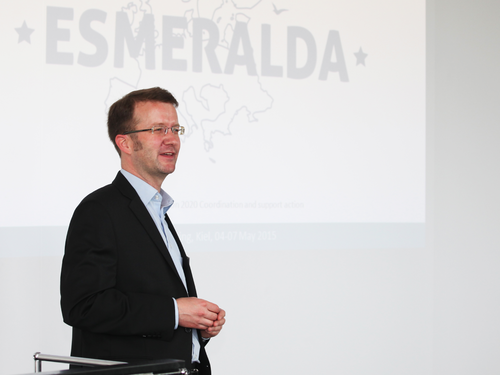
Project co-ordinator opening the kick-off meeting ; Credit: Christian Urban, Uni Kiel
The 3 day meeting presented an opportunity for partners to meet and discuss future plans for teh successful development of the project.
The meeting ended with an excursion to monitor ecosystem services around Kiel.
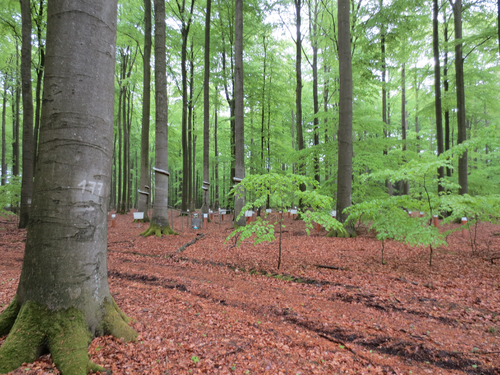
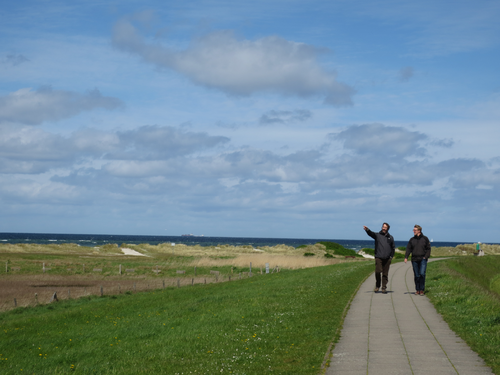
EMSERALDA Excursion: Credit: Linda Scholten

